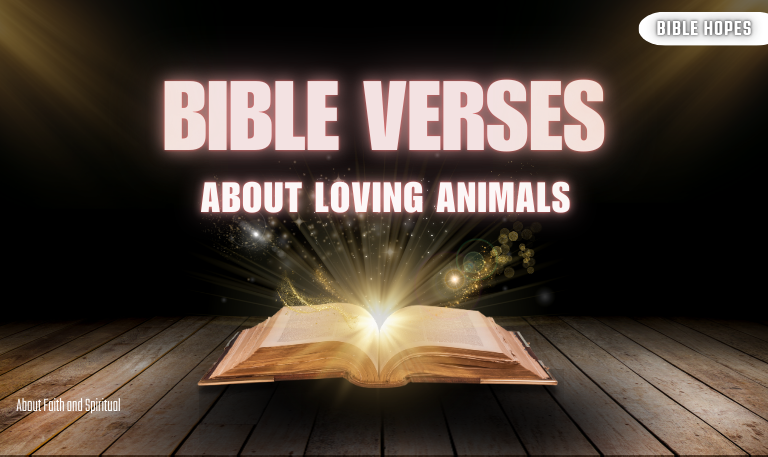Animals have long been cherished companions and essential parts of human life. But what does the Bible say about our relationship with animals? Are there clear teachings on how to love and care for animals in God’s creation? This article dives deeply into Bible verses about loving animals, exploring the rich biblical foundation for compassion, kindness, and stewardship toward all creatures.
Whether you’re a Christian seeking spiritual guidance on animal welfare or simply curious about Scripture’s teachings, this authoritative resource covers everything from key verses and theological insights to practical applications for today’s believers.
Biblical Foundation for Loving Animals
The Bible reveals a clear divine concern for animals throughout Scripture, beginning with the creation narrative. From Genesis to Revelation, animals are woven into God’s plan — both as part of the natural order and as beings worthy of compassion.
Creation and God’s Care for Animals
Genesis 1:20-25 describes God creating animals, emphasizing their intrinsic value and purpose.
Humans are given “dominion” (Genesis 1:26-28) over animals — often misunderstood as permission for exploitation, but better interpreted as responsible stewardship.
God’s care extends not just to humans but to “all that He made” (Psalm 145:9).
This divine stewardship mandates that humans act as caretakers, protecting and respecting animal life.
Read Also: Bible Verses About Enemy Attacks
Key Bible Verses About Loving and Caring for Animals
Here are some powerful Bible verses highlighting God’s expectations about how we treat animals:
| Scripture | Verse Summary |
|---|---|
| Proverbs 12:10 | “The righteous care for the needs of their animals…” |
| Psalm 36:6 | God’s steadfast love is for all creatures. |
| Matthew 10:29 | God notices even sparrows that fall to the ground. |
| Deuteronomy 25:4 | “Do not muzzle an ox while it is treading out the grain.” |
| Exodus 23:5 | Help an animal in distress, even if it belongs to your enemy. |
| Jonah 4:11 | God cares for animals as much as humans in Nineveh. |
These verses illustrate that loving animals is part of living righteously and following God’s example of compassion.
Bible Verses About Kindness to Animals
Kindness toward animals is a recurring theme with practical implications:
Deuteronomy 22:6-7: Command not to take a mother bird with her young, reflecting care for animal families.
Proverbs 27:23: Encouragement to know the condition of your flock, showing attentive care.
Luke 12:6: “Are not five sparrows sold for two pennies? Yet not one of them is forgotten by God.”
Showing kindness reflects the Creator’s character and is integral to biblical ethics.
Symbolism of Animals in the Bible
Animals also serve rich symbolic purposes in Scripture:
Lamb: Innocence, sacrifice, and purity (John 1:29).
Dove: Peace and the Holy Spirit (Matthew 3:16).
Lion: Strength, courage, and sometimes divine authority (Revelation 5:5).
Understanding these symbols enhances our appreciation of biblical messages about animals.
Old Testament Teachings on Animals
The Old Testament offers many examples of God’s care for creatures:
Psalm 104:14-15: God provides food for animals.
Job 12:7-10: Encouragement to learn from the wisdom of animals and the earth.
Exodus 20:10: Animals also rest on the Sabbath, highlighting their value in God’s design.
These teachings highlight that animals are part of God’s covenant with creation.
New Testament Perspectives on Animals
The New Testament emphasizes compassion:
Matthew 6:26: God feeds the birds, teaching trust and care.
Luke 13:15: Jesus defends the care of animals on the Sabbath.
Revelation 5:13: All creatures, including animals, praise God, signifying their eternal importance.
Animals are part of the renewed creation and God’s ongoing work.
Christian Theology: Stewardship vs. Dominion
Dominion (Genesis 1:26) is often misunderstood as domination. Instead, biblical stewardship calls for:
Responsible care and protection of animals.
Respecting their intrinsic worth as God’s creation.
Avoiding cruelty or exploitation.
This balance forms the ethical foundation for Christian animal welfare.
Practical Ways to Show Love for Animals as Christians
Here are actionable steps to live out biblical compassion:
Provide humane care to pets and farm animals.
Support animal welfare organizations aligned with Christian values.
Practice responsible consumption, including mindful meat-eating.
Educate communities on ethical stewardship.
Advocate for creation care through church initiatives.
These actions embody faith through kindness and respect.
Famous Christian Advocates for Animal Welfare
Several historical and modern figures inspire animal compassion:
St. Francis of Assisi: Known as the patron saint of animals, he preached kindness to all creatures.
C.S. Lewis: Wrote about the moral significance of animals and their place in God’s kingdom.
Animal Welfare Ministries: Today, many churches support care efforts reflecting biblical principles.
Their legacy encourages Christians to integrate faith and care.
Read Also: Bible Verses About Gossip and Slander
Animals and Eternal Life in Scripture
What about animals in the afterlife?
Isaiah 11:6-9: Describes a peaceful kingdom where animals live in harmony.
Revelation 5:13: All creatures praise God eternally.
Romans 8:19-22: Creation awaits redemption, implying animals share in God’s restoration.
Though debated, many theologians affirm animals have a place in God’s eternal plan.
Bible Verses About Loving Animals FAQs
Q: What Does the Bible Say About Loving Pets?
A: The Bible encourages compassion and care for all animals, including pets, as part of stewardship and reflecting God’s love (Proverbs 12:10).
Q: Are Animals Considered Part of God’s Creation?
A: Yes, Scripture consistently affirms animals are created by God and sustain His care (Genesis 1, Psalm 145:9).
Q: Do Animals Have Souls According to the Bible?
A: The Bible is less explicit about animals having immortal souls like humans, but it recognizes their life force and God’s concern for their well-being.
Q: How Can Christians Apply Biblical Teachings to Animal Welfare Today?
A: By practicing kindness, avoiding cruelty, supporting humane treatment, and advocating for ethical stewardship in all areas involving animals.
Q: What Bible Verses Encourage Compassion for All Living Creatures?
A: Key verses include Proverbs 12:10, Matthew 10:29, Psalm 145:9, and Jonah 4:11.
Q: Is It Sinful to Eat Meat According to the Bible?
A: The Bible permits eating meat but also calls for respect for animals and avoiding cruelty (Genesis 9:3, Deuteronomy 25:4).
Q: Do Bible Verses Suggest Animals Will Be in Heaven?
A: Revelation 5:13 and Isaiah 11 describe animals in the renewed creation, suggesting their eternal role.
Conclusion
The Bible offers a profound and compassionate perspective on loving animals—rooted in God’s care for all creation and humanity’s responsibility as stewards. From ancient laws protecting animal welfare to Jesus’ teachings on compassion, Scripture calls believers to live out kindness toward animals as a reflection of divine love. By embracing these biblical principles, Christians can honor God’s creation, care for animals with integrity, and inspire others to do the same. May this guide serve as a beacon to deepen your understanding and practice of love for all living creatures.

![15 Bible Verses About Wicked Government [2025 Explained] 3 15-Bible-Verses-About-Wicked-Government-[2025-Explained]](https://biblehopes.com/wp-content/uploads/2025/05/15-Bible-Verses-About-Wicked-Government-2025-Explained.png)

